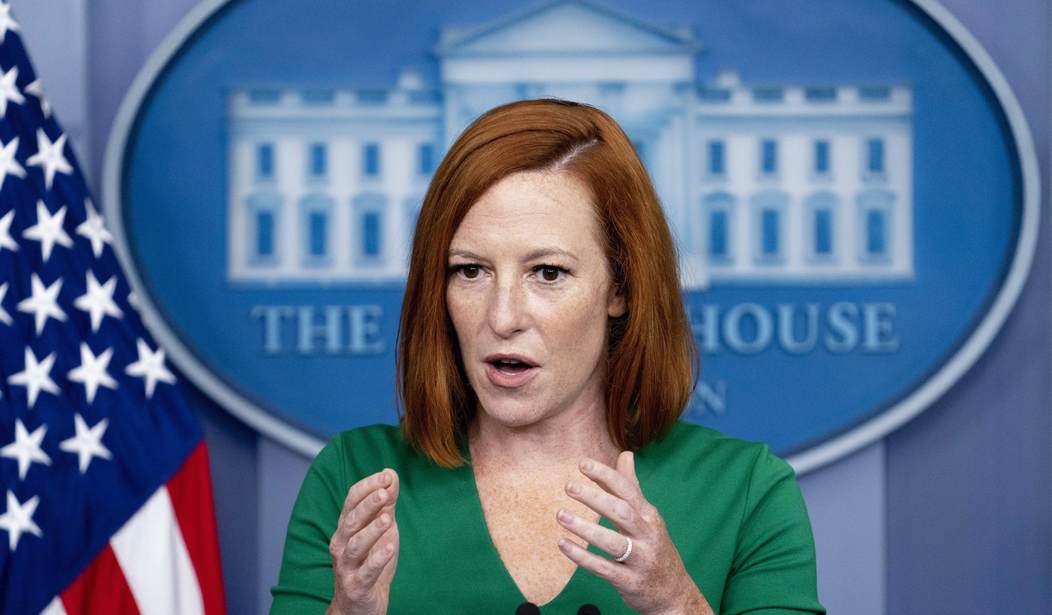The United States is facing record high inflation, as Katie covered on Wednesday, but you might not know it based on the Biden administration's response and the gaslighting from the Democratic Party. Of all the coverage on inflation, Democrats chose to highlight Paul Krugman's opinion piece, "History Says Don’t Panic About Inflation," as the DNC War Room did in a Friday email about the op-ed. Further, White House Press Secretary Jen Psaki framed inflation in quite the newsworthy way on Friday.
Early in the Friday press briefing, Psaki claimed while answering a reporter that inflation has "become a political cudgel and it shouldn't be."
Later in the press briefing, though, she went on to place the blame on Republicans. "I would note that we don’t have partnership from — with — from most Republicans on that. We hear a lot of screaming about inflation. We don’t hear a lot of solution agreements or willingness to participate in a solution, and that’s really — or a discussion of a solution. And that’s really what we’re looking for at this point in time," she also said.
Psaki emphasized that inflation is expected "to substantially decelerate next year," even telling a reporter "I know you’re not talking about that, but that’s an important component here."
It's worth mentioning other coverage from The New York Times, in a piece by Jeanna Smialek, which, unlike Krugman's, is not an opinion piece. In "Fastest Inflation in 31 Years Puts More Heat on Washington," she writes:
Administration and Fed officials alike have maintained that rapid inflation should eventually fade. But they have had to revise how quickly that might happen: Supply chains remain badly snarled, and demand for goods is holding up and helping to fuel higher prices. As wages begin to rise in many sectors amid labor shortages, there are reasons to expect that some businesses might charge their customers more to cover climbing worker costs. October’s data did nothing to alleviate that growing sense of unease.
Recommended
A New York Times DealBook piece updated on November 10 also detailed "Should You Worry About Inflation? Experts Weigh In."
It's particularly rich that Psaki would bring up former Treasury Secretary under Bill Clinton and economic advisor to Barack Obama, Larry Summers, when the Biden administration ignored his warnings.
Summers made headlines earlier this week for his appearance on CNN's "Cuomo Prime Time," where Chris Cuomo categorized Summers position as one where "inflation doesn't come fast, doesn't leave fast. This is going to be with us for a while."
As Summers went on to say about the administration, it's "behind the curve" and "not recognizing" certain issues:
I think they're just not recognizing just how much demand is being created by the tremendous wall of money, 15 percent of GDP, in one year, that they released, last spring.
And that, in conjunction with central bank, the Fed that keeps the interest rate at zero, that's buying all kinds of bonds and mortgages, when, the middle of a housing boom, just sets off a dynamic that, then the thing about inflation, is you start chasing your tail.
Rising inflation, of inputs, leads firms to raise their prices. That leads other firms to raise their prices. And the whole thing spirals. It can be broken. But it needs to be broken by some kind of dramatic action. And those kinds of dramatic actions often cause recessions.
So, I think we're speeding down the road, at a really rapid rate. It's kind of a downhill road. And it's not going to be so easy, to put the brakes on here. And that's why I'm concerned.
And I think the -- I think that the policymakers, in Washington, unfortunately, have, almost every month, been behind the curve.
They said it was transitory. It doesn't look so transitory. They said it was due to a few specific factors. Doesn't look to be a few specific factors. They said, when September came, and people went back to school that the labor force would grow. And it didn't happen.
Writing for the New York Post, Callie Patteson references several warnings Summers has made before, specifically about the COVID stimulus plan, such as an op-ed in the Washington Post from February 4, comments he made to that same outlet in March, and comments he made to Axios in May.
Regardless of what the Biden administration chooses to highlight and ignore, the American people are hurting. Psaki herself admitted that inflation "is "impacting... millions of Americans no matter their political party. And that’s certainly of concern to the President."
It doesn't appear that the American people buy that, though. As I highlighted in a VIP piece last night, a recent poll from The Economist/YouGov found that a plurality of Americans, at 37 percent, say Biden "doesn't care at all" when asked how much Biden cares about "the needs and problems of people like you."
According to polling data from RealClearPolitics (RCP), Biden is underwater by 15.2 percentage points when it comes to how he is handling the economy. Using polls from October 16-November 9, RCP indicates that he has a 38.7 percent approval rating and 53.9 disapproval rating.

























Join the conversation as a VIP Member